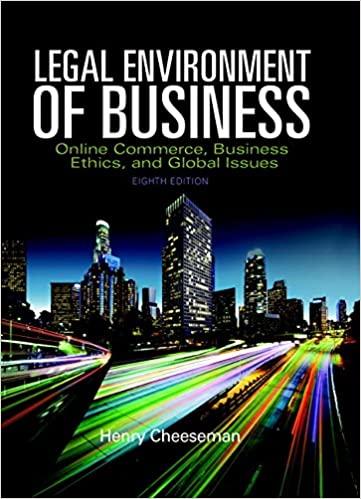Question
Directors and Officers of a corporation 1. can be held criminally liable for offences committed by them for the benefit of the corporation but cannot
Directors and Officers of a corporation
| 1. | can be held criminally liable for offences committed by them for the benefit of the corporation but cannot be held criminally liable for offences committed by the corporation while under their supervision. | |
| 2. | cannot be held criminally liable for offences committed by them for the benefit of the corporation or by the corporation while under their supervision. | |
| 3. | Only a corporation itself, because it is a legal person, can be held criminally liable. Not the directors or the officers who are merely employees. | |
| 4. | can be held criminally liable for offences committed by them for the benefit of the corporation or by the corporation while under their supervision. | |
| 5. | cannot be held criminally liable for offences committed by them for the benefit of the corporation but can be held criminally liable for offences committed by the corporation while under their supervision. |
2.
Rescission refers to
| 1. | all of the above. | |
| 2. | an equitable remedy that withdraws a contract and attempts to return both parties to their original positions. | |
| 3. | an equitable remedy in which one party believes there is a mistake in the contract. | |
| 4. | a discretionary remedy developed through common law by following a precedent. | |
| 5. | a contract that exists until set aside by a court. |
3.
Are there any restrictions on a corporation paying dividends to its shareholders?
| 1. | The only restriction is what a corporation decides. | |
| 2. | As per s. 42 of the CBCA, a corporation may still pay a dividend to shareholders even if (1) there are reasonable grounds for believing that the corporation is, or would after the payment be, unable to pay its liabilities as they become due; and (2) if the realizable value of the corporation's assets would thereby be less than the aggregate of its liabilities plus its stated capital of all classes. | |
| 3. | There are no restrictions on a corporation paying dividends because a corporation exists to make a profit for shareholders and therefore restricting sharing the profits is anathema to a corporation's reason for existing. | |
| 4. | The only restriction is what shareholders decide. | |
| 5. | As per s. 42 of the CBCA, a corporation may not pay a dividend if (1) there are reasonable grounds for believing that the corporation is, or would after the payment be, unable to pay its liabilities as they become due; and (2) if the realizable value of the corporation's assets would thereby be less than the aggregate of its liabilities plus its stated capital of all classes. |
4.
What are some of the most important powers given to directors of a corporation?
| 1. | to declare dividends. | |
| 2. | to adopt bylaws | |
| 3. | all of the above. | |
| 4. | to call meetings of shareholders | |
| 5. | to issue shares |
5.
Step by Step Solution
There are 3 Steps involved in it
Step: 1

Get Instant Access to Expert-Tailored Solutions
See step-by-step solutions with expert insights and AI powered tools for academic success
Step: 2

Step: 3

Ace Your Homework with AI
Get the answers you need in no time with our AI-driven, step-by-step assistance
Get Started


